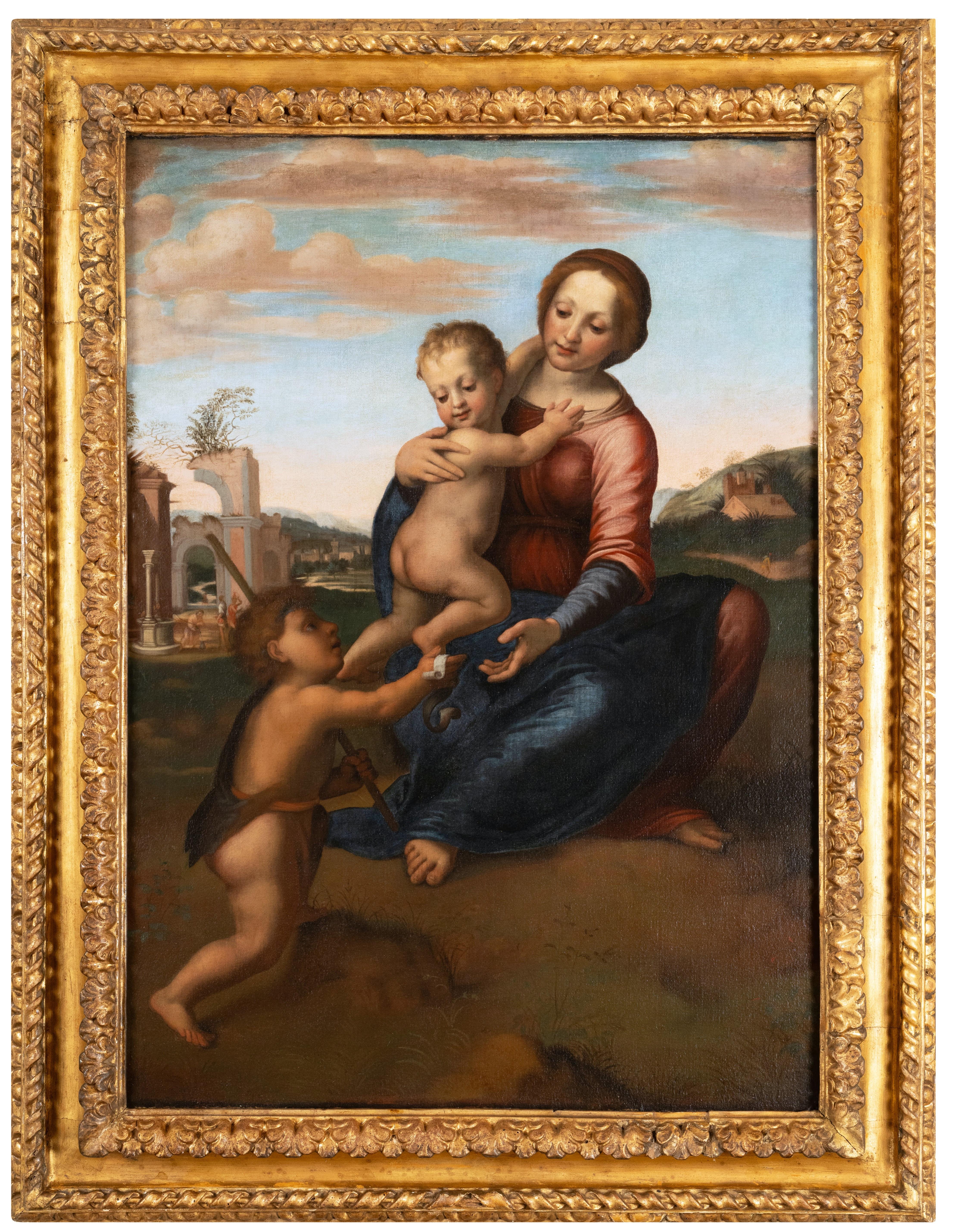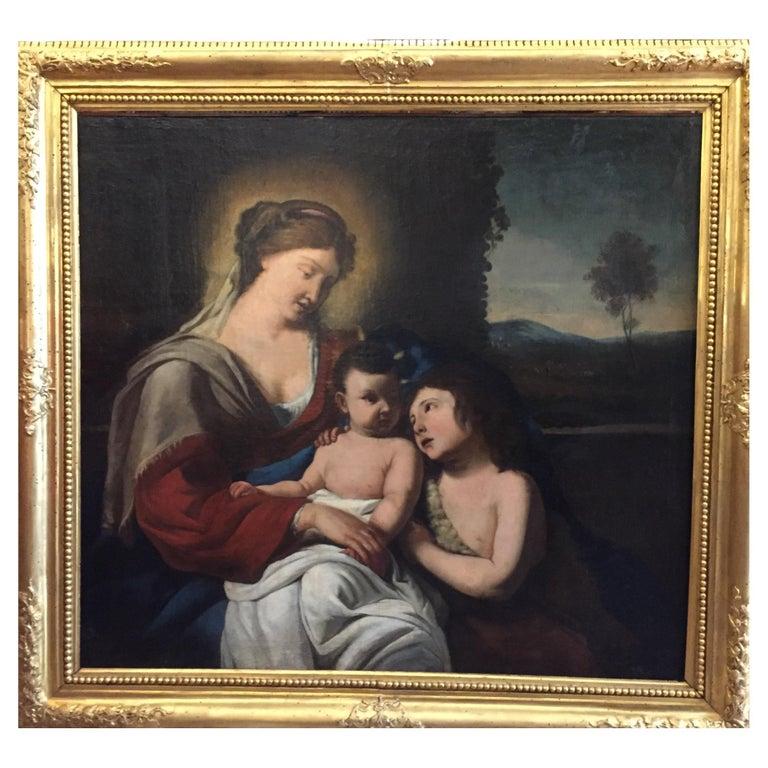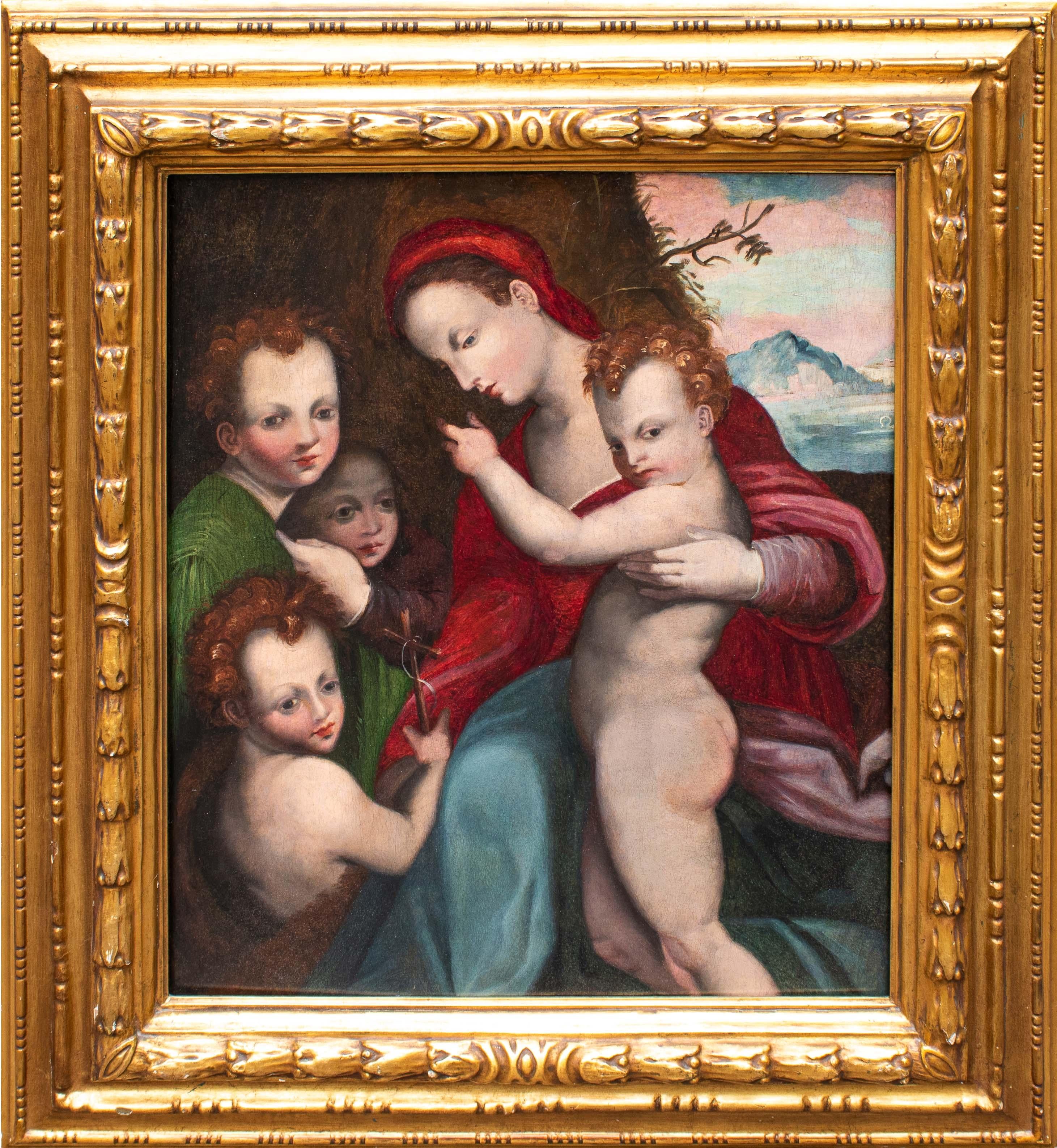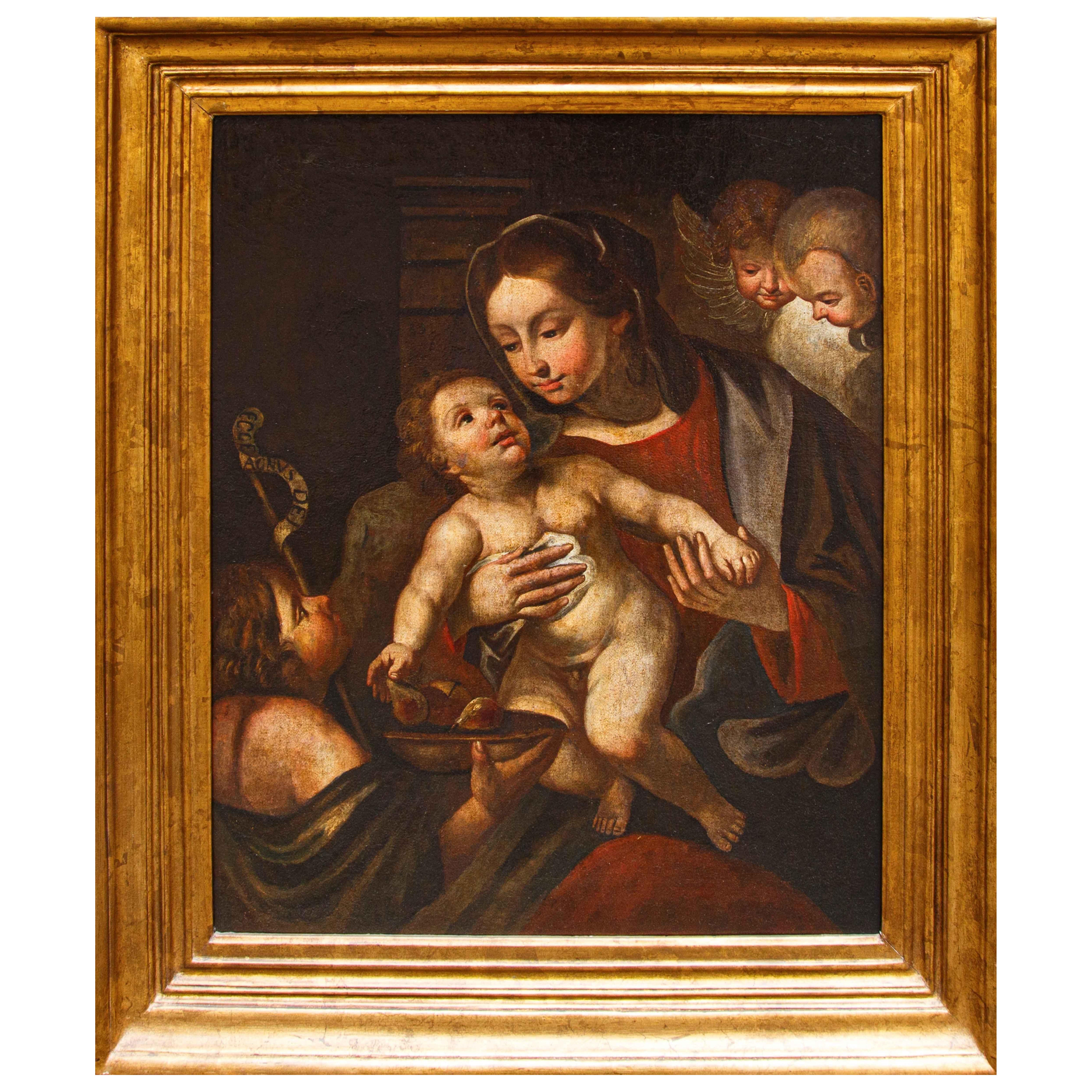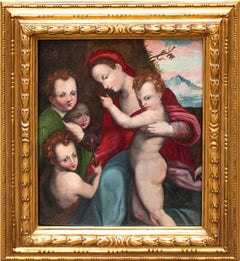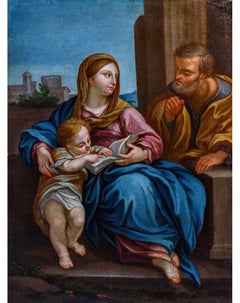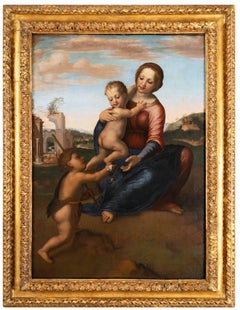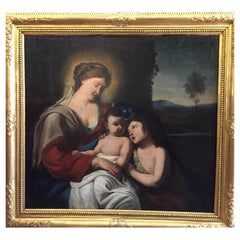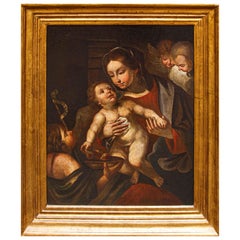Items Similar to Raphael Vanni's workshop (Siena, 1595- 1673), Madonna and Child
Want more images or videos?
Request additional images or videos from the seller
1 of 16
Raphael Vanni's workshop (Siena, 1595- 1673), Madonna and ChildXVII Century
XVII Century
$4,166.65
£3,094.33
€3,500
CA$5,727.58
A$6,384.74
CHF 3,360.51
MX$77,400.86
NOK 42,785.64
SEK 39,780.28
DKK 26,645.73
About the Item
Workshop of Raphael Vanni (Siena, 1595- 1673)
Madonna and Child, St. John and two angels announcing the crucifixion
Oil on canvas, 69 x 94 cm
Framed, 85 x 100 cm
The painting discussed here constitutes one of several variants of a successful composition devised by the well-known Sienese artist Raphael Vanni. The prototype of the subject, which evidently had a considerable fortune, coinciding with a work that passed into a private collection, allows us to establish at what time the painter conceived this composition. The canvas, in fact, ties in with Vanni's work of the early 1640s: in particular, it shows clear similarities with the St. Helen of Santa Maria in Publicolis in Rome, executed in 1644 for Cardinal Marcello Santacroce. Here the saint has a type so similar to that of the Madonna in the painting under review that we think the painter used the same model. Identical also appears to be the use of color shaping the soft draperies, thus the red robe of St. Helena marked by pasty folds reappears in the Madonna of the work presented here. Not to mention the same nuanced delicacy of milky complexions that accumulates the two works to the Madonna and Child with Seven Seraphim in the Banca Monte dei Paschi di Siena (inv. 2961), another cornerstone of this extraordinary 1644, the year that saw the painter's definitive consecration not only in Siena but also in Rome, where he took an active part in the great undertaking of the fresco decoration of the Palazzo Patrizi. The scene takes place in a domestic setting: the Virgin is embroidering, when the Child draws her attention to two angels who are hoisting the Cross. Our Lady leaves her work and with a melancholy expression tenderly embraces the Child while St. John tries to console him. St. Joseph, watchful in the background, arrives with his donkey probably to flee with the Family to Egypt. The episode, which is a clear premonition of the Passion, is denoted by its pathetic and dramatic accents. The composition is throbbing with both the dynamism of the groups and the overheated poetics of the affects, key components in terms of the development of Baroque taste. This compositional scheme introduced by Vanni, thanks in part to the circulation of engravings, spread throughout the peninsula and was imitated by various artists: crucial in this regard is the version of the painting located at the Neapolitan church of Santa Maria di Chiaia.
Raphael Vanni was a painter who worked mainly in his hometown of Siena, straddling the late Mannerism and early Baroque periods, leaving a significant imprint on 17th-century Sienese art. Born in 1595, his artistic training was rooted in an environment still deeply influenced by the great Tuscan Mannerist tradition, but Vanni soon proved sensitive to the new currents that were emerging in Rome and elsewhere. His first steps in the art world probably saw him as a pupil or otherwise close to the workshop of Francesco Vanni, his father and respected Mannerist painter. From him she learned the rudiments of drawing, composition and the use of color, absorbing that grace and elegance typical of Sienese Mannerism. However, Raphael did not simply replicate his father's stylistic features; his desire to update pushed him to a crucial trip to Rome. In the papal capital, Vanni was able to come into contact with the works of the great masters of the early Baroque, particularly those of Pietro da Cortona, whose dynamism, chromatic richness and monumental figures fascinated him deeply. This Roman experience was crucial to his stylistic evolution. On his return to Siena, he brought with him a renewed sensibility, combining the Mannerist refinement inherited from his father with a greater vitality and drama typical of the emerging Baroque taste. His works, scattered in various churches and palaces in and around Siena, bear witness to this stylistic synthesis. Raphael Vanni was a prolific artist, capable of tackling sacred and secular themes with equal skill. His altarpieces are notable for their balanced composition, skillful use of light, and expressive rendering of characters, often characterized by wavy draperies and eloquent gestures. Despite the Roman influence, Vanni always maintained a link with the Sienese tradition, visible in the delicacy of the volutes and in a certain compositional grace that was never completely abandoned in favor of pure Baroque impetus. His career spanned many decades, passing through different stylistic phases reflecting the cultural and artistic changes of the seventeenth century. He died in his native Siena in 1673, leaving behind an artistic legacy that helped define the Sienese painting scene of his time, standing as a transitional figure between two eras and demonstrating the ability to assimilate and reinterpret new trends without ever losing his own identity.
- Creation Year:XVII Century
- Dimensions:Height: 27.17 in (69 cm)Width: 37.01 in (94 cm)
- More Editions & Sizes:cm 69 x 94Price: $4,167
- Medium:
- Circle Of:Raffaello Vanni (1587 - 1657, Italian)
- Period:
- Condition:
- Gallery Location:Milan, IT
- Reference Number:1stDibs: LU2639216763962
About the Seller
No Reviews Yet
Vetted Professional Seller
Every seller passes strict standards for authenticity and reliability
1stDibs seller since 2023
Typical response time: <1 hour
- ShippingRetrieving quote...Shipping from: Milan, Italy
- Return Policy
Authenticity Guarantee
In the unlikely event there’s an issue with an item’s authenticity, contact us within 1 year for a full refund. DetailsMoney-Back Guarantee
If your item is not as described, is damaged in transit, or does not arrive, contact us within 7 days for a full refund. Details24-Hour Cancellation
You have a 24-hour grace period in which to reconsider your purchase, with no questions asked.Vetted Professional Sellers
Our world-class sellers must adhere to strict standards for service and quality, maintaining the integrity of our listings.Price-Match Guarantee
If you find that a seller listed the same item for a lower price elsewhere, we’ll match it.Trusted Global Delivery
Our best-in-class carrier network provides specialized shipping options worldwide, including custom delivery.More From This Seller
View AllFollower of Andrea del Sarto, Madonna and Child
By Andrea Del Sarto
Located in Milan, IT
Follower of Andrea del Sarto (Florence, July 16, 1486 - Florence, September 29, 1530)
Madonna and Child, St. John and two Angels
Oil on panel, 73 x 61.5 cm
With frame 100 x 90 cm...
Category
16th Century Other Art Style Figurative Paintings
Materials
Oil, Board
By Giovanni Battista del Verrocchio, Madonna and Child with St. John the Baptist
Located in Milan, IT
Giovanni Battista del Verrocchio, known as The Master of Volterra (Florence 1494 - 1569)
Madonna with Child and San Giovannino
Oil on panel, 63 x 50 cm
Frame: 92 x 80 cm
The styl...
Category
16th Century Other Art Style Figurative Paintings
Materials
Oil, Board
Scope of Carlo Maratta (Camerano, 1625 - Rome, 1713), Holy Family
By Carlo Maratti
Located in Milan, IT
18th century, scope of Carlo Maratta (Camerano, 1625 - Rome, 1713)
Holy family
Oil on copper, 38 x 26.5 cm
Framed, 55.5 x 44.5 cm
Carlo Maratta, who was born in Camerano, Marche,...
Category
18th Century and Earlier Other Art Style Figurative Paintings
Materials
Copper
By Francesco del Brina, Nativity
Located in Milan, IT
Francesco Del Brina (Florence, 1529 - 1586)
Nativity
Oil on panel, 70 x 47.5 cm
Framed, 80 x 58 cm
Critical Record Prof. Alessandro Delpriori
The work is not signed
Born into a ...
Category
16th Century Other Art Style Figurative Paintings
Materials
Oil, Board
Mid-17th century, Rubensian School, Holy Family with St. John
By (After) Peter Paul Rubens
Located in Milan, IT
Mid-17th century, Rubensian School
Holy Family with St. John and Elizabeth
Oil on copper, 36.3 x 29.5 cm
Framed, 47 x 38 cm
The painting is not signed
The glassy texture, glacia...
Category
18th Century and Earlier Other Art Style Figurative Paintings
Materials
Canvas, Oil
By Benvenuto Tisi, known as Il Garofalo, Madonna in Glory with Child
Located in Milan, IT
19th century, by Benvenuto Tisi da Garofalo, called Il Garofalo (Canaro or Garofalo, 1476 or 1481 - Ferrara, 1559)
Madonna in Glory with Child
Oil on canvas, 82 x 80 cm
Framed, 92...
Category
19th Century Other Art Style Figurative Paintings
Materials
Canvas, Oil
You May Also Like
17th century Italian school, The Virgin and Child with Saint John the Baptist
Located in PARIS, FR
17th century Italian School
The Virgin and Child with Saint John the Baptist
Oil on canvas
Dimensions: h. 106 cm, l. 77 cm
Important 17th century Italian carved giltwood frame
Fram...
Category
17th Century Old Masters Figurative Paintings
Materials
Canvas, Oil
Madonna With Child and St. John 17th century Italian Lombard School
Located in Milano, IT
Italian religious painting of the Lombard School Madonna and Child with St. John ca. 1650 with a good balanced and harmonious composition in the center of which is the Child with hi...
Category
Mid-17th Century Baroque Figurative Paintings
Materials
Gold Leaf
Italian school, 17th century, Madonna and Child with St. John
Located in Milan, IT
Italian School, 17th century
Madonna and Child with St. John
Oil on canvas, 86 x 99 cm
Framed, 113 x 93 cm
The seventeenth-century painting presents the Virgin intent on presenti...
Category
Antique 18th Century and Earlier Italian Other Paintings
Materials
Canvas
Madonna Child Maria Sassoferrato Paint Oil on canvas 17th Century Old master Art
Located in Riva del Garda, IT
Giovan Battista Salvi known as 'il Sassoferrato' (1609 - 1685) circle/ workshop
Madonna with sleeping child
Oil on canvas
84 x 66 cm - Framed (19th century) 112 x 95 cm
The paintin...
Category
17th Century Old Masters Paintings
Materials
Oil
$9,762 Sale Price
20% Off
Madonna Scarsella Paint Oil on canvas Old master 16/17th Century Raffaello Art
Located in Riva del Garda, IT
Ippolito Scarsella, known as Lo Scarsellino (Ferrara, around 1550 - 1620) workshop
Altarpiece depicting the Madonna and Child, St. James the Greater and the donor in armour
Technique: oil on panel
Measurements: 93 x 72 cm./with frame 109 x 86 cm.
Provenance: Prato, Farsetti, auction of 28.10.2016, lot 261 (link)
A majestic Madonna in Glory occupies the upper register of the canvas, seated on a blanket of iridescent clouds surrounded by angels, flanked by a cherub who scatters flowers contained in a cornucopia towards the infant Christ as a sign of abundance, naked and supported with both hands from the mother.
In the lower part of the composition stands the figure of San Giacomo Maggiore, one of the twelve apostles, standing on the right side of the altarpiece, represented dressed in a humble tunic; one arm holds the open Gospel book, while the other holds a cross pilgrimage staff.
A particular aspect of the table is the presence in the central part, to indicate its importance, of the figure of the donor, kneeling on a cushion, with his hands joined in prayer and his face observing the Virgin in an attitude of devotion, while on the opposite lectern is placed a prayer book; depicted with the features of a young leader in armor, with a sword and a rich iridescent red cloak, elements which, combined with his authoritarian composure, enhance his ennoblement.
Unlike the medieval altarpieces, the knight is here included in the space of the painting and has proportionate dimensions to those of the other characters, returning to all intents and purposes in the sacred scene, with a pose that cannot but evoke the detail of the 'Montefeltro altarpiece' made by Piero della Francesca for Federico da Montefeltro, kneeling in front of the sacred group in the guise of a leader.
On the right, the view recedes into depth highlighting the background of an urban landscape set on a hill behind which a mountain range stands out, with the peculiarity of the arched aqueduct that runs along the entire landscape. Presumably among these expanses were the donor's own possessions and his hometown.
It is a quality table, imbued with the late Mannerist style still resistant in the second half of the 16th century, characterized by a 'sweet and affable religiosity, rendered through a manner of studied simplicity and grace', which highlights the unmistakable stylistic and chromatic connotations of the produced...
Category
16th Century Old Masters Paintings
Materials
Oil
$10,504 Sale Price
20% Off
Madonna Correggio Paint Oil on table 16th Century Old master Italian Religious
Located in Riva del Garda, IT
School of Antonio Allegri, known as Correggio (Correggio c. 1489 - 1534)
Attributable to Pomponio Allegri (Correggio, 1522 - Parma, 1593)
Madonna and Child, Two Angels and John the B...
Category
16th Century Old Masters Paintings
Materials
Oil
$17,952 Sale Price
20% Off
